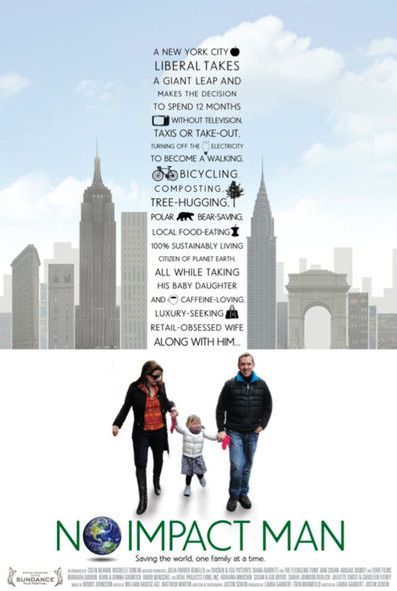Elizabeth Kolbert’s latest essay for The New Yorker is another triumph, a perfectly pitched marriage of style and substance.
It’s about Colin Beavan’s blog-turned-book-turned-movie No Impact Man, Vanessa Farquharson’s Sleeping Naked Is Green: How an Eco-Cynic Unplugged Her Fridge, Sold Her Car, and Found Love in 366 Days, and other recent experiments in (well-to-do, white, urban) asceticism. Kolbert’s dry wit is underappreciated. You gotta love this paragraph:
Farquharson’s “green-ovations” range from the significant (“sell my car”) to the useful (“turn down my thermostat,” “fix things rather than replace them”) to the downright ditzy (“go to eco-friendly spas,” “shop at green malls,” “use a natural lubricant instead of K-Y”). The day after she resolves to “use no more toothpicks,” Farquharson is shown a house that’s for sale not far from her apartment in Toronto. It’s newly renovated, with three stories, and, in terms of Farquharson’s ecological footprint, represents an awful lot of toothpicks. She immediately buys it. (“I must have this house,” she writes.) Meanwhile, even though flying is pretty much the most carbon-intensive activity possible, Farquharson is constantly taking to the air. At one point, she flies to Banff for a writers’ workshop. At another, she flies to Portland, Oregon, to undertake, of all things, a sustainability-oriented bike trip. (During the trip, she sleeps with one of the trip’s leaders, and so a few weeks later he flies to Toronto to stay with her.) She flies to Tel Aviv to visit another guy she will eventually sleep with. Finally, she flies to New York, where she seeks out Beavan, because, as she puts it, there’s “no way” she is going to go all the way to Manhattan “without confronting my competi— . . . I mean, meeting my fellow green blogger.” They rendezvous, at Beavan’s suggestion, at the Grey Dog’s Coffee, on University Place, which, Farquharson sniffs, doesn’t seem “especially green in any way.” Naturally, the talk turns to shit.
There’s plenty of fun to be had at the expense of these wannabe Thoreaus, but Kolbert does have a point to make. The problem here is that “lifestyle changes” are conceived of as strictly bounded by the individual’s private sphere. Says Kolbert:
The real work of “saving the world” goes way beyond the sorts of action that “No Impact Man” is all about.
What’s required is perhaps a sequel. In one chapter, Beavan could take the elevator to visit other families in his apartment building. He could talk to them about how they all need to work together to install a more efficient heating system. In another, he could ride the subway to Penn Station and then get on a train to Albany. Once there, he could lobby state lawmakers for better mass transit. In a third chapter, Beavan could devote his blog to pushing for a carbon tax. Here’s a possible title for the book: “Impact Man.”
To put a slightly more fine point on this, I’ve long lamented that America seems to have devolved into two spheres, the private, which now contains almost everything of meaning to individuals, and the public, which is “government doing its thing somewhere far away.”
What’s missing is the middle sphere, the civic sphere, in which people do things collectively outside the state (via churches, neighborhood groups, voluntary associations, etc.). Pushing his quest into that sphere would have been much more brave of Beavan; he has less control over it, and progress is much slower and more frustrating, but it would much better illustrate what we’ll all need to do if we want reduce our collective impact.
Anyway, I once wrote a post about this: “10 things we can do: rebuilding civil society.” Give it a read, it’s nice companion piece to Kolbert’s.



